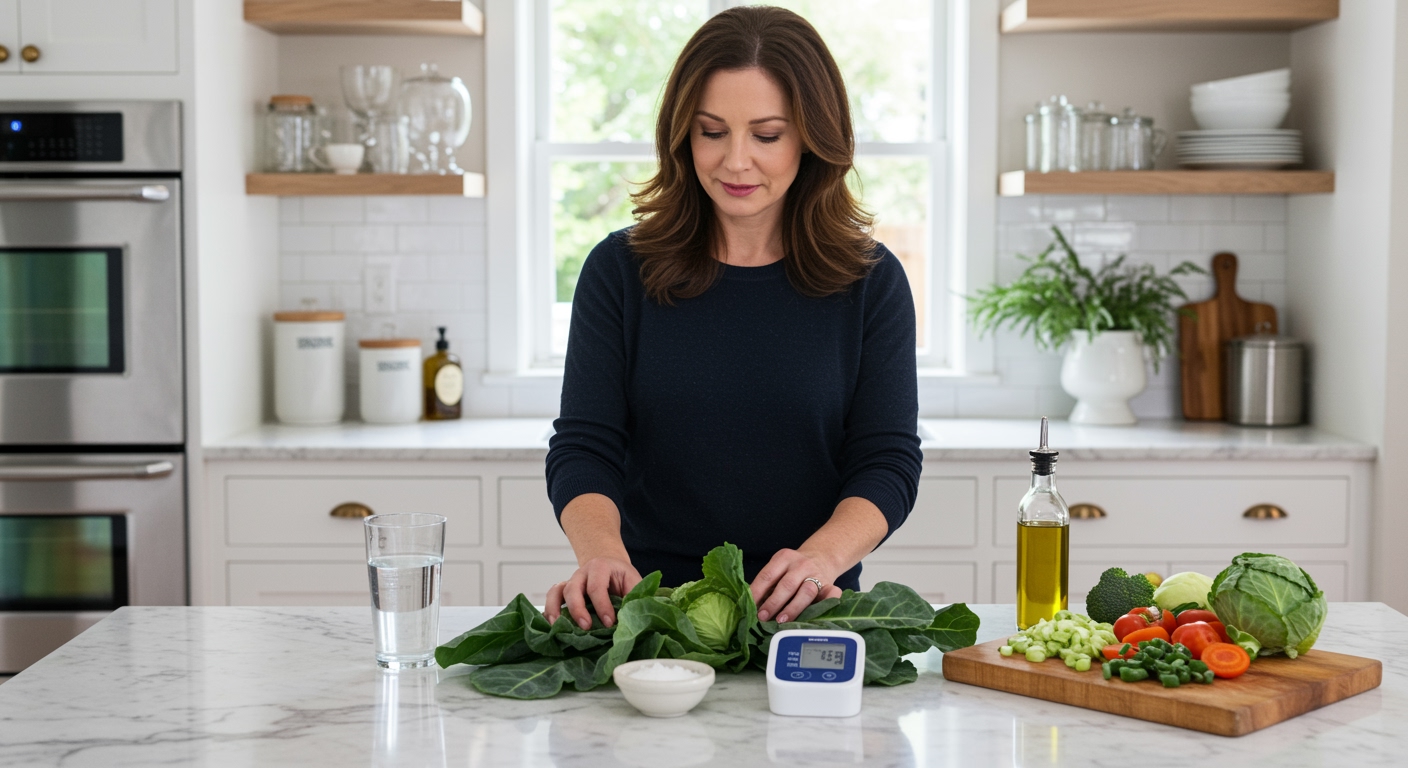✪ Key Takeaway: Collard greens can lower blood pressure but rarely cause dangerous hypotension in healthy people with normal eating habits.
Introduction
Your doctor tells you to eat more vegetables for better health, but then you hear whispers about collard greens dropping blood pressure too low.
You might be asking this question because you already have low blood pressure and worry that adding collard greens to your diet could make things worse.
Hi, I am Abdur, your nutrition coach and today I am going to explain exactly how collard greens affect your blood pressure and whether you should be concerned.
How Do Collard Greens Actually Affect Blood Pressure?
Collard greens contain several compounds that can influence your cardiovascular system in meaningful ways.
The most significant player is potassium, with one cup of cooked collard greens providing about 220 milligrams of this essential mineral.
Potassium works by helping your kidneys remove excess sodium from your body through urine.
When sodium levels drop, your blood vessels can relax and your blood pressure naturally decreases.
Collard greens also contain nitrates, which your body converts into nitric oxide.
Nitric oxide acts as a powerful vasodilator, meaning it helps widen your blood vessels and improve blood flow.
✪ Fact: One cup of collard greens contains more potassium than a medium banana.
Can Collard Greens Make Low Blood Pressure Dangerous?
The short answer is that collard greens alone are unlikely to cause dangerously low blood pressure in most people.
Your body has sophisticated mechanisms to maintain blood pressure within safe ranges.
When blood pressure drops too low, your kidneys respond by retaining more sodium and releasing hormones that constrict blood vessels.
However, certain situations could potentially make collard greens more problematic for people with existing low blood pressure.
If you take blood pressure medications, the combination of medication effects plus the natural blood pressure lowering properties of collard greens could theoretically cause issues.
People with severe kidney disease might also need to be more cautious because their bodies cannot regulate electrolyte balance as effectively.
✪ Pro Tip: Monitor your blood pressure regularly if you have hypotension and increase vegetable intake significantly.
What About People Taking Blood Pressure Medications?
This is where things get more interesting and potentially concerning.
If you take ACE inhibitors, beta blockers, or diuretics, adding large amounts of potassium-rich foods like collard greens could enhance the blood pressure lowering effects.
ACE inhibitors work by blocking an enzyme that narrows blood vessels, and the potassium in collard greens can amplify this effect.
Diuretics help your body eliminate excess fluid, and when combined with the natural diuretic properties of potassium, the effect could be more pronounced.
However, most doctors actually encourage patients on blood pressure medications to eat more vegetables.
The key is gradual introduction and regular monitoring rather than complete avoidance.
✪ Note: Never stop taking prescribed medications without consulting your healthcare provider first.
How Much Collard Greens Is Too Much?
The question of quantity matters more than most people realize.
Eating a normal serving of collard greens (about one cup cooked) a few times per week is unlikely to cause problems for anyone.
Problems might arise if you suddenly start consuming multiple cups daily as part of an extreme health kick or juice cleanse.
Your body needs time to adjust to significant increases in potassium and other bioactive compounds.
People with low blood pressure should pay attention to symptoms like dizziness, fatigue, or lightheadedness after eating large amounts of collard greens.
The timing of consumption also matters – eating large portions on an empty stomach might have more pronounced effects than eating them with a balanced meal.
✪ Pro Tip: Start with small portions and gradually increase to allow your body to adapt naturally.
What Should You Do If You Have Low Blood Pressure?
If you have diagnosed low blood pressure, you do not need to avoid collard greens completely.
Instead, focus on moderation and smart meal planning.
Eat collard greens as part of balanced meals that include adequate sodium, healthy fats, and protein.
The protein and fat help slow down the absorption of potassium and other compounds, reducing any sudden impact on blood pressure.
Consider cooking methods that might reduce the concentration of blood pressure lowering compounds.
Boiling collard greens and discarding the cooking water removes some potassium, though you also lose other valuable nutrients.
Most importantly, track how you feel after eating collard greens and adjust your portions accordingly.
✪ Note: Keep a food and symptom diary to identify any patterns between collard green consumption and blood pressure changes.
The Bottom Line
Collard greens can lower blood pressure, but they rarely cause dangerous hypotension in healthy people eating normal portions.
Smart nutrition means understanding your individual needs rather than fearing healthy foods.
I would love to hear about your experiences with collard greens and blood pressure in the comments below – your insights help other readers make informed decisions about their health.
References
At NutritionCrown, we use quality and credible sources to ensure our content is accurate and trustworthy. Below are the sources referenced in creating this article:





